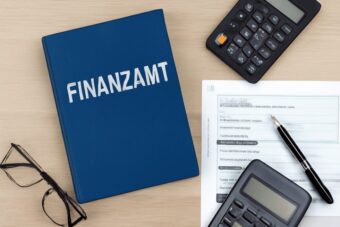As a foreigner in Germany, leasing a car can be an attractive option for those who prefer not to commit to purchasing a vehicle. Whether you're planning to stay temporarily or you simply prefer flexibility, understanding the car leasing process in Germany is crucial. In this article, we'll take a closer look at what you need to know about leasing a car in Germany, from the benefits to the requirements and the costs involved. This is reported by the G.Business website.
Why Leasing a Car in Germany is a Good Option
Leasing a car in Germany is a popular choice for many residents and expats alike. It offers several advantages, such as lower upfront costs, the ability to drive a new car every few years, and predictable monthly payments. Leasing allows you to enjoy a new vehicle without committing to the long-term responsibility of ownership, making it an attractive choice for many people. With the growing demand for flexible transportation options, car leasing has become a common practice, especially among people who move to Germany for work or study. By choosing to lease a car, you can benefit from lower monthly payments and a variety of car models without having to worry about maintenance or depreciation.
- Lower monthly payments: Leasing often results in lower monthly payments compared to financing a car purchase, which can be ideal for those on a budget.
- No long-term commitment: Since leases typically last between 2 to 4 years, you won't be tied to the same vehicle for an extended period.
- Access to new cars: Leasing allows you to drive a new car every few years, ensuring you're always behind the wheel of the latest model with the latest features.
Differences Between Leasing and Buying a Car in Germany
While leasing offers flexibility, it is essential to understand how it differs from buying a car. Buying a car means you own it, whereas leasing means you are essentially renting it for a fixed period.
- Ownership: When you buy a car, you own it outright once it's paid off. With leasing, the car remains the property of the leasing company.
- Upfront costs: Leasing generally requires less money upfront compared to buying a car, which often involves a hefty down payment.
- End of term: At the end of a lease, you return the car, whereas, with ownership, you can keep the car as long as you wish.
How Leasing Works in Germany: A Step-by-Step Guide
- Choose your car: Start by selecting the car you want to lease. Different leasing companies may offer various makes and models.
- Understand the terms: Carefully read the leasing terms, including the duration, monthly payments, and mileage limits.
- Apply for leasing: Submit your application along with the necessary documents (proof of identity, income, and address).
- Sign the lease: Once approved, sign the contract and start enjoying your new vehicle.
Requirements for Leasing a Car in Germany
Leasing a car in Germany involves several requirements, especially for foreigners. Understanding these prerequisites will help you navigate the process more smoothly. Foreigners may find the leasing process in Germany a bit more complex, but it is definitely manageable with the right information and preparation. You will need to ensure that you meet the basic legal and financial requirements to secure a lease. Being familiar with the necessary documentation and requirements will make the process easier and increase your chances of getting approved for a lease. Keep in mind that leasing companies in Germany often have strict guidelines regarding credit history, income verification, and proof of residence.
- Proof of residence: You will need proof that you are residing in Germany, such as a rental contract or utility bill.
- Credit history: Leasing companies often check your credit history to ensure you are financially reliable. If you're a foreigner, this can sometimes be a challenge, but there are companies that offer leasing options for those with limited or no German credit history.
- Income verification: You will be required to show proof of income, typically in the form of pay slips or a bank statement.
- Valid driver’s license: A valid German or international driver’s license is necessary.
Documents Needed for Car Leasing
To start the leasing process in Germany, you’ll need the following documents:
- Proof of identity (passport or ID card)
- Proof of address in Germany (rental contract or utility bill)
- Bank statements or proof of income
- A valid driver’s license
- If applicable, proof of creditworthiness or a deposit
The Role of Your Credit History in Leasing
Your credit history plays a crucial role in the approval process for a car lease in Germany. Leasing companies use this to assess your ability to make timely payments. If you're new to Germany and have no established credit history, you may be required to pay a larger deposit or provide a co-signer.
The Costs of Leasing a Car in Germany
Leasing costs in Germany can vary depending on the make and model of the car, the duration of the lease, and other factors. Understanding these costs is crucial before committing to a lease agreement. Many foreigners are often surprised by the low upfront costs of leasing, but they may overlook additional fees or conditions that can make leasing less affordable in the long term. Being aware of all the potential costs involved will allow you to make a more informed decision. Additionally, understanding what is included in the lease (such as maintenance or insurance) can help you better compare the options available.
Breakdown of Car Leasing Costs
- Monthly Payments: The most significant part of leasing costs is the monthly payment. These payments are typically lower than financing a car, but they vary depending on the vehicle you choose and the leasing terms.
- Initial Deposit: Some leasing companies require an initial deposit. This is usually a percentage of the car's value and can range from 10% to 30%.
- Maintenance and Insurance: In some cases, leasing contracts include maintenance and insurance costs. Be sure to check if this is included in your contract, as it can help reduce your overall expenses.
Additional Fees to Watch Out For
While the cost of leasing a car might seem affordable at first, there are a few additional fees to keep in mind:
- Excessive wear and tear: If the car has damage beyond normal wear and tear when you return it, you may be charged additional fees.
- Mileage limits: Most leases come with mileage limits, and exceeding these limits can result in extra charges.
- Early termination: Ending your lease contract early may come with a penalty, so it's important to know the terms before signing.
Leasing a Car as a Foreigner in Germany
If you're not a German citizen, you can still lease a car in Germany, but there are a few additional things you need to consider. Understanding the specific hurdles that foreigners face in Germany can help you better prepare for the leasing process. Some leasing companies in Germany may be more flexible with foreigners than others, so it's important to shop around. Additionally, having the proper documentation and financial stability can make a significant difference in securing a lease. Knowing which companies offer special services for foreigners can save you time and effort in the process.
Key Challenges for Foreigners
- Credit history: As a foreigner, you might not have a German credit history, which can make the process more difficult. However, some leasing companies specialize in working with foreigners or offer solutions like a higher deposit to compensate for the lack of a credit score.
- Language barriers: Leasing contracts are typically written in German, so it's essential to understand the terms before signing. It may be worthwhile to have a translator or legal expert review the contract for you.
- Temporary residence: Many leasing companies require that you have a valid residence permit, so be prepared to provide evidence of your legal stay in Germany.
How to Improve Your Chances of Approval
To increase your chances of being approved for a car lease in Germany, consider the following:
- Get a German bank account: A German bank account will make it easier for leasing companies to verify your financial status and transfer payments.
- Use a co-signer: If you're having trouble with credit approval, having a German co-signer can sometimes help.
- Provide a larger deposit: If your credit history is limited or non-existent, offering a larger deposit can make your application more attractive to leasing companies.
Best Car Leasing Companies in Germany
There are numerous leasing companies in Germany, each offering different vehicles and terms. Here’s a comparison of some of the most popular car leasing options:
| Company Name | Monthly Lease Price | Car Models Available | Additional Features |
|---|---|---|---|
| Sixt | From €99 | Audi, BMW, Mercedes | Maintenance included |
| LeasePlan | From €150 | Volkswagen, Skoda | Flexible contracts |
| Volkswagen Leasing | From €120 | Volkswagen, Porsche | Insurance and maintenance |
How to Choose the Right Car Leasing Company
When selecting a car leasing company, consider the following factors:
- Reputation: Check online reviews and ratings to see how other customers feel about the company.
- Contract flexibility: Some companies offer more flexible terms than others, so look for one that suits your specific needs.
- Customer service: It's essential to have a responsive and helpful customer service team in case you have any issues with your lease.
Is Car Leasing Right for You
Leasing a car in Germany can be a convenient and cost-effective solution for many expats and residents. However, it is essential to understand the process, the requirements, and the potential costs before making a decision. By doing your research and choosing the right leasing company, you can enjoy all the benefits of driving a car without the long-term commitment.
If you’re considering leasing a car, be sure to compare options, understand the terms, and know your rights as a consumer. Remember, a well-leased car can enhance your experience in Germany, whether you’re here for a short stay or planning to stay long-term.
Stay connected for news that works — timely, factual, and free from opinion — and insights that matter now: нow to Invest in Germany as a Non-Resident: A Comprehensive Guide






